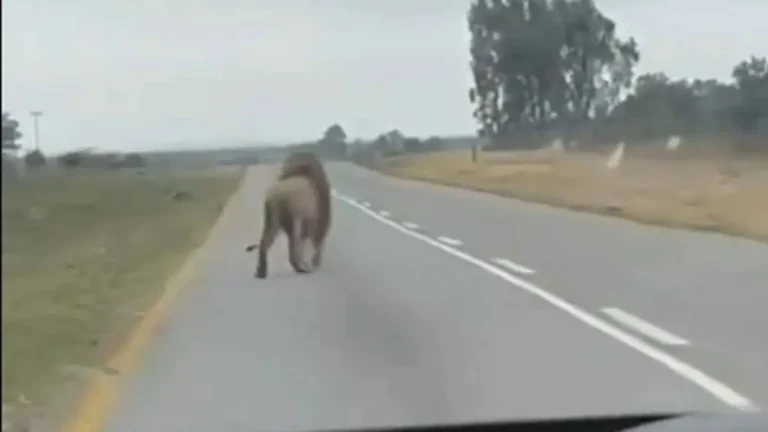A startling incident in the North West has reignited debate over the commercial transport of wild animals. This is after a fully grown male lion leapt from the roof of a moving trailer. The animal, which had been sedated and was being relocated from the Free State to a game farm near Nietverdiend in the Ramotshere Moiloa region, was filmed standing atop the vehicle moments before making the dangerous jump.
Thank you for reading this post, don't forget to subscribe!Shocking Footage Raises Welfare Concerns
Videos of the lion’s dramatic leap circulated widely online, showing the big cat balancing precariously on the roof before landing on the roadside. Animal welfare organisations have since expressed alarm, saying the incident highlights serious gaps in wildlife transport regulation in the country.
The lion was later recaptured by a team led by veterinarian Dr Anton Nel from the Lichtenburg Animal Hospital. Thankfully, it sustained only minor injuries. Nel described the escape as “extraordinary,” explaining that the trailer’s smooth, 2.5-metre-high walls should have made it impossible for the animal to climb out. He believes the lion squeezed through an observation hatch in the roof before making its daring exit.
Calls for Stronger Regulation and Enforcement
Fiona Miles, director of Four Paws South Africa, said her organisation welcomed government’s swift decision to investigate the circumstances of the escape. She stressed that transporting apex predators demands strict adherence to welfare and safety standards.
“Events like this underline the urgent need for tougher oversight and enforcement,” Miles said. “We stand ready to assist authorities with expertise and sanctuary space to prevent future risks and ensure wild animals are treated with the respect they deserve.”
Miles noted that while the lion appeared unharmed, the episode raises red flags about how easily wild animals are bought, sold, and moved across provinces. She cited three key laws regulating such activities:
- Animals Protection Act (Act 71 of 1962): Bans transport under conditions causing unnecessary suffering.
- Animal Health Act (Act 7 of 2002): Ensures compliance with disease control and transit permit requirements.
- National Environmental Management: Biodiversity Act: Governs the keeping, transport, and permitting of listed species such as lions.
“Failure to comply can result in prosecution, seizure of animals, and criminal charges,” Miles added, urging authorities to clamp down on non-compliance.
NSPCA Verifies Footage and Investigates Permits
The National Council of SPCAs (NSPCA) confirmed the authenticity of the video and said its Wildlife Protection Unit had identified the lion’s owner.
According to Jacques Peacock, the NSPCA’s communications manager, moving a lion legally requires valid export, import, and transport permits from provincial conservation authorities. “Our Wildlife Protection Unit is verifying whether such permits were in place when this translocation occurred,” he said.
The NSPCA has since launched an inquiry into potential breaches of wildlife transport regulations.
“Extraordinary Escape” Ends Safely
Dr Nel said he was called to assist shortly after 15:00. This was roughly an hour after the escape occurred along the road between Lichtenburg and Zeerust. Fortunately, the lion’s sedation had not fully worn off, making it easier to contain.
“It was calm and resting under a tree when we arrived,” Nel explained. “After it was darted again, it moved a short distance before falling asleep, and we were able to load it without any issues.”
A Wake-Up Call for Wildlife Transport
Animal welfare groups say the shocking escape should serve as a wake-up call for the wildlife industry. Four Paws has renewed its push for a national phase-out of the commercial captive lion industry, stricter inspections, and more effective enforcement of existing laws.
“This could have ended in tragedy—for the animal and for motorists,” Miles warned. “We must ensure that incidents like this never happen again by prioritising animal welfare and public safety in every aspect of wildlife management.”
Related article: Gauteng’s Nature Reserves: All You Need to Know for an Unforgettable Outdoor Escape




